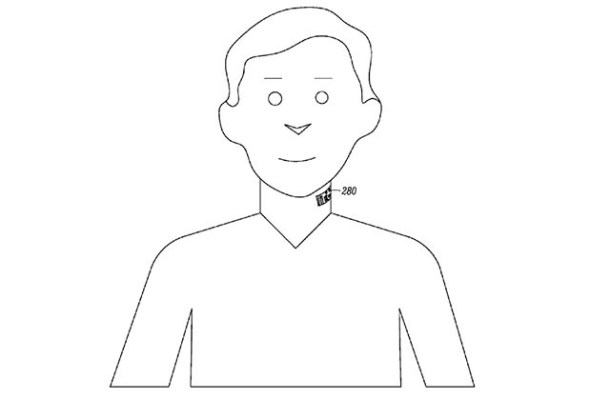You’ve got to give Motorola credit these days: it’s certainly not your average smartphone player any more. The company is trying to upend the traditional notion of a smartphone with Project Ara, and behind closed doors it’s building a new group devoted to designing and developing “world-class” wearable tech.
Thanks to the patent process though, not all of Motorola’s potential wearable projects are a secret. Engadget scrounged up one such patent earlier today. Just take a look at this recently published Motorola patent application, titled “Coupling An Electronic Skin Tattoo To A Mobile Communication Device,” and let it sink in.
The idea is that an “electronic tattoo” nestled on a wearer’s neck could directly capture sound “emanating from a throat” and transmit it to a smartphone (or a similar computing device) by way of a Bluetooth, Zigbee, or NFC connection, thus eliminating the awful background noise that mars many a phone call. Other potential applications could see the tattoo fitted with a display of sorts, or a galvanic skin response detector that could basically service as a lie detector.
As is usual for patents, Motorola has chosen to paint a portrait of these electronic tattoos with broad strokes but in short it’s a smart, if mildly kooky way to tackle an actual problem people face. And of course, there’s nothing about the patent application that makes such a tattoo anthrocentric, and Motorola itself mentions the possibility of slapping these things on animals.
Why? I have no idea.
Now before you start freaking out at the mental visual of a tattoo artist weaving electronic components into your neck flesh, know that Motorola has a history of playing fast and loose with its interpretation of the word “tattoo.” At AllThingsD’s D11 conference held earlier this year, the head of the Google subsidiary’s Advanced Technology and Research Group sat onstage wearing what she referred to as an “electronic tattoo” consisting of a thin, pliable device that adheres to a user’s skin and could be replaced on a weekly basis.
Even though Motorola has already developed RFID tattoos and authentication tokens that can operate from the depths of your gut (with help from outside parties, anyway), you shouldn’t expect this thing to hit store shelves any time soon. There’s a good chance that Motorola is just cooking up concepts and patenting them to prevent any opportunistic outsiders from trying something similar. But who knows? They may actually want to turn this into an honest-to-goodness product.
